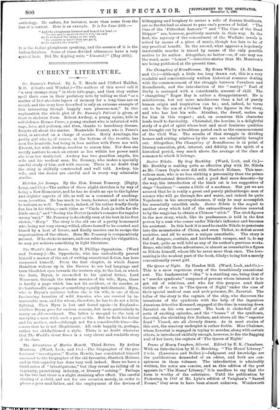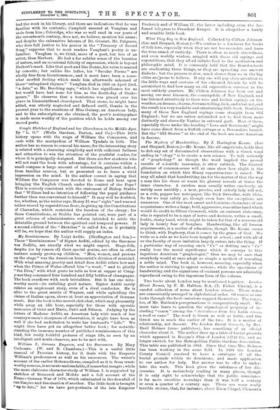Poems of Henry Vaughan, Sitarist. Edited by E. K. Chambers.
With an Introduction by H. C. Beeching. " The Muses' Library." 2 vols. (Lawrence and Bullen.)—Judgment and knowledge are the qualifications demanded of an editor, and both are con- spicuous in these volumes. The introduction is admirably written, the notes are concise, and as this edition of the poet appears in " The Muses' Library," it is needless to say that the form is worthy of the substance. Until the publication by Pickering in 1847 of Mr. Lyte's edition of Vaughan's " Sacred Poems," they seem to have been almost unknown. Wordsworth had the work in his library, and there are indications that he was familiar with its contents ; Campbell sneered at Vaughan and stole from him ; Coleridge, who was so well read in our poets of the seventeenth century, does not, we believe, mention his name ; and despite the exhaustive labours of Dr. Grosart, Mr. Palgrave, who does full justice to his genius in the "Treasury of Sacred Song," supposes that to most readers Vaughan's poetry is un- familiar. Vaughan is, we think, more of a poet, but less of an artist, than Herbert. He had a far subtler sense of the beauties of nature, and an occasional felicity of expression, which is beyond Herbert's mark. Like that poet and like Donne, his verse is marred by conceits ; but unlike the latter, his " Secular Poems " are wholly free from licentiousness, and it must have been a some- what morbid feeling which made him afterwards ashamed of these" unbaptised rhymes." Vaughan died in 1695 on April 23rd, "a date," as Mr. Beeching says, " which has significance for us but would have had none for him, as the death-day of Shake- speare." He observes that a tombstone was placed over his grave in Llansaintfread churchyard. That stone, he might have added, was utterly neglected and defaced until, thanks in the present year to the exertions of Miss Guiney, an American lady, and to the subscriptions she obtained, the poet's resting-place is made more worthy of the position which he holds among our sacred poets.























































 Previous page
Previous page